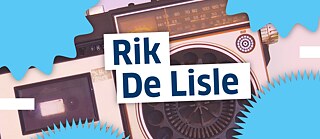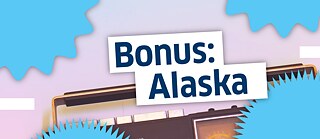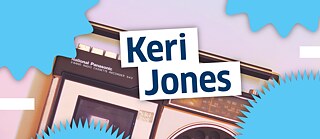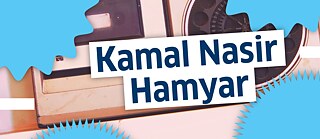Zeitgeister On Air Radio Around the World #6 with Rik De Lisle

Since the 1980s, Rik De Lisle has been on Berlin Radio so frequently that his young son used to think every kid could listen to their dad live on air all the time, they just had to turn on the radio to hear his voice. Rik is now 76 – and still broadcasting. He’s known as “Der alte Ami”, and in this episode he tells Dina Elsayed about his journey from Texas via Thailand to Berlin, a journalism crash course in the US armed forces, doo-wop music, and how he experienced the fall of the Berlin Wall.
Subscribe: Apple Podcasts | Spotify | RSS
Transcript
Dina Elsayed: Welcome to Radio Around the World, brought to you by Goethe-Institut. I’m your host, Dina Elsayed, of Common Ground Berlin. Today’s guests started on air long before many of us were born and is a Berliner who is a pillar of radio culture in the German capital.
[Radio clip Berliner Rundfunk 91.4 FM]
He is a 76-year-old disc jockey and moderator at Berliner Rundfunk and RADIO BOB!. I asked Rick, who’s a Milwaukee native, whether radio played an important role in his family life.
Rik De Lisle: Yes and no. I raised the kids for a while alone, my two oldest kids. They would like to come into the studio and they learned when the red light is on, don’t say anything. They sort of grew up with radio, which on the one hand, made it unimportant to them. It’s like “We grew up with this.” On the other hand, I remember when my son was in kindergarten, one of his friends was saying, “I never get to see my dad enough.” And Billy told him, “Why don’t you just turn on the radio? You can listen to him.” – because kids think everybody’s parents do the same thing. I mean, up until today I’m still working at two radio stations, doing daily shows – it’s an accepted part of our life, you know, “Dad’s on the radio.”
Dina Elsayed: And what about when you were younger? Were you listening to the radio when you were young?
Rik De Lisle: All the time. I had no brothers or sisters and my family was the radio. I listened every chance I had. If I wasn’t at school or playing basketball, I was listening to the radio. I knew the names of all the disc jockeys, all these groups in those days, like 50s music, Doo Wop groups, and early soul music, sort of took the place of my family. I had no idea what was going on with radio. I had no idea how that worked. When the guys…when they’d sing the name of the station, I thought, you know, there’s like singers in the corner and the disc jockey points his finger at him and it’s time for them to sing. This was like real 50s radio. It was great stuff to listen to and I was just a radio freak always.
Dina Elsayed: You enlisted in the Air Force at the age of 17. How did that lead you to doing radio?
Rik De Lisle: My first radio job was at KTFM in San Antonio, Texas. I was working at the base newspaper in San Antonio, Texas at the School of Airspace Medicine. And KTFM was a radio station that concentrated on military employees, civil servants. And they had this program where they did little news shows about what was happening at the different air bases. And so I did the Brooks Air Force Base School of Aerospace Medicine ‘news thing’ for KTFM. And that was the first radio stuff I ever did.
Dina Elsayed: You also did a stint in Alaska, right?
Rik De Lisle: When I was stationed in Alaska, we were in a hospital that was off base in the middle of the woods. There was not much going on, it was expensive and boring – and the hospital had its own radio station for anybody who wanted to drop by and be a disc jockey. So, I walked onto the basement of the hospital and played records for nobody, just for me.
Dina Elsayed: Right, and do you think you would have turned to radio as a career without the military experience? Or was this some sort of a catalyst for you?
Rik De Lisle: I doubt it because the whole way I got, and really got, involved in radio is the base newspaper had an advertisement in it – “We are looking for radio and television moderators for the American Forces Network.” I was a medic, which was okay, but it wasn’t anything that I really loved to do. It was like, okay, this is my job. But I saw this and I said, “God, to work in radio and television…that would be…that would be so great.” And so I did a demo tape and they accepted me. And they sent me to the school where they trained all military radio and television people – and it was a great school. The class was 12 weeks long. And on day one, you started doing radio shows for the next six weeks.
Dina Elsayed: That’s a steep learning curve…
Rik De Lisle: And after the six weeks were up, you started doing TV shows for the next six weeks. So you were like, you had weeks and weeks of actual on air experience before they ever let you out of there. And so, I learned real quick because I was really excited about being there. If I hadn’t have had that, I don’t know if I ever would have gotten around to getting in radio or television.
Dina Elsayed: Did your hosting or DJing style change in the different countries you were stationed in?
Rik De Lisle: No, they changed over the years as I got smarter and better. You know, like most other disk jockeys or radio moderators, you have sort of a role model – “Boy, I’d like to sound like that guy or I’d like to sound like her.” And so, you tend to, sort of, imitate them as you’re going along trying to find your own style. And so, I never really changed because of the country I was in, except in Germany when I started broadcasting in German – which naturally changed my whole world.
Dina Elsayed: And when and how did you end up in Berlin?
Rik De Lisle: The Air Force sent me here. I was stationed in West Germany after I left Southeast Asia and Thailand. I was the last broadcaster to leave Thailand, actually. We’re supposed to be gone by Christmas 1975. And in April of 1976, I left because they needed somebody to help pack up all the radio and television stations. And then they sent me to Germany and I was in West Germany and I was like “No, I don’t like this very much. How do I get out of here?” And the guy at the personnel office said “Well, we have…we have an opening in West Berlin at the AFN station there.” And I thought, okay, another year in West Berlin and I’m out of here. And it can’t be worse than West Germany. And they sent me here and as of day one, I fell in love with this place – literally as of day one. I had the chance to keep extending my time here because the Air Force in those days had a point system. And you had more points if you were in a combat zone than if you were in a normal base. And the war was over so nobody could get as many points as I did. I spent four and a half years in Southeast Asia. And so I stayed here until my 20 years in the Air Force was up and then transferred over to German radio.
Dina Elsayed: I was reading that you are one of the longest serving hosts on the Berlin airwaves. And of course, not only did the radioscape in Berlin change, but the whole of Berlin has completely transformed since you started working here. So, how has that affected the way you do your radio work or has it at all?
Rik De Lisle: So the station I was working at was in West Berlin, but we were broadcasting to East Germans. It was a joint venture for the German government and the USIS – the United States Information Service. So we were in West Berlin, but our signal went all over East Germany and obviously East Berlin. When the [Berlin] Wall came down, it was a game changer, obviously because during the time, that from 84 to 89, if you listened to our radio station, you could be put in jail. And there were people put in jail for listening to the ‘Propaganda-Sender’ in West Berlin. When the Wall came down, it was like, whoa, all of a sudden everybody could listen to us and they did. One thing you have to understand is that German radio in the 80s was very, very conservative. Our station, RIAS 2, was the first radio station in Germany to play pop music 24 hours a day – and this was like 1984. So, everybody wanted to listen to us. And when the Wall came down, they could even say they were listening to us, which is great for your ratings. And so, I doubled the audience, you know, overnight. At the same time, the East Germans had to stop. They had jammers on to jam our frequency in different areas of East Germany. So they had to stop the jammers, they took them down. Actually, we got we drove off and got one of the jammers and put it in the lobby of the radio station. So, when people walked in, they could see this East German jammer, huge thing must have been three feet high or feet across really evil looking Star Wars thing that kicked us off the air.
Dina Elsayed: When I first moved to Berlin, I started to listen to your show on Berliner Rundfunk. And for me as a sucker for 80s music this was the world for me. And it was a launching pad for my interest in listening to more German content on the radio. And I always loved to listen to your introduction. And I wanted to ask you, how did you come up with your signature on-air introduction, “Der alte Ami”?
Rik De Lisle: Oh, that’s a little hard to explain in English, but when we started RIAS 2 which was this pop music station in 1984, I had already retired from the Air Force. I was like 36, 37 and everybody else at the radio station was like 20 or 21 years old. And when you’re 20, anybody who’s 36 is old. And there was a meeting going on and one of the editors was late – a friend of mine, Brigitte. And she came through the door and I’m like “Hey, Brigitte, what the hell? We’ve been waiting here since forever.” And she says to me, “Du alter Ami, halt’ die Klappe.”, which is German for “Hey, old American, shut your mouth.” And I said, Jesus, if everybody’s laughing at this, it must be a great nickname. At the same time, my wife who’s a Berliner always used to say, still does, on the telephone when she calls somebody, “Hi, icke bin’s.” which means, “Hello, it’s me.”, but with a Berlin accent. And so I put the two of them together and started the next day going, “Hi, icke bin’s, alter Ami, Rik De Lisle.” And that’s how that thing started and I’ve been using that now since 1984, which is, or ’85, a long time. And since nobody can pronounce my last name because it’s French and it’s easier to remember nicknames, I just became the “Der alte Ami” which is great, actually.
Dina Elsayed: Is it still something that listeners use when they address you? Were there any funny, memorable situations that resulted from having this memorable nickname?
Rik De Lisle: Usually, when I, if anybody recognizes me, they’ll just say, “Hey, Rick, how are you doing?” Which is very un-German, because Germans are mostly formal if they don’t really know anybody really well. It’s this ‘Sie’ and ‘Du’ thing that they have with the language. And so, for me, it’s like a compliment. When somebody comes up and doesn’t talk to me in the formal ‘hochdeutsch’ it’s like, hey, this person thinks they know you or feels like they know you – which is, you know, one of the best compliments a disk jockey could have. I run into people all the time who now in the meantime – I mean, I’m 76 years old – I’ve run into people who, you know, grew up listening to my radio show, which is great, actually. And so, you know, I’m still on the air every day. So, it’s like, they’re like, “Oh, okay. The world hasn’t blown up yet. The old dude is still on the radio.” I’m sure there’s lots of people who are going, “When is this guy going to piss off, because we’re tired of listening to him.” But, at least up until now, it’s been a successful run. It’s the entertainment business without having to be an entertainer – because nobody sees you. And I think this brotherhood of radio broadcasters is a definite plus. It’s a shame that so many people now are going to YouTube or podcasts or blah, blah, blah, blah, blah – because, yes, I understand that, this is 2023. Aside from everything else, what they miss out on is this sort of family feeling from working in a radio station.
Dina Elsayed: Do you still listen to the radio yourself?
Rik De Lisle: Yes and no. I’m kind of picky now. Radio has lost the ability to deliver a personality to me. As far as I’m concerned, there’s audio – that’s music and information. And there’s radio – that’s personalities who entertain me. And the trend is, for years now, away from personalities and into content and lots of other things that make money – which is okay. It’s gotten professional and it’s a money maker now. But it’s just not that thing. You know, disk jockeys that I grew up within the 50s can never be beat. These guys were crazy. They look for crazy people who didn’t want to make much money and let them be on the air, you know. That is not the case these days. I may be the only crazy person left in German radio.
Dina Elsayed: What do you listen to if you were to listen to the radio these days?
Rik De Lisle: Mostly oldies, 50’s music. I’ve got a couple of Doo Wop stations on my internet radio that I listen to. There’s a syndicated version of Wolfman Jack that I like to listen to. One of the best disk jockeys in the entire world. And there’s internet versions of American Bandstand with Dick Clark, which I think is interesting. And I’m really feeling in a dangerous mood I’ll listen to Nights with Alice Cooper. Alice does a worldwide radio show and I like to listen to it.
Dina Elsayed: Do you think there is still a future for radio music or music in radio?
Rik De Lisle: Yeah. If they put a couple of personalities on the air. Radio has no chance of beating anybody with the music. Just forget about it. You need personalities.
Dina Elsayed: And there are certainly few personalities on air like Rik De Lisle. You can hear him on his shows at Berliner Rundfunk 91.4 FM and RADIO BOB! via the internet. I’m Dina Elsayed of Common Ground Berlin and thank you for listening.
Host:Radio Around the World is brought to you by the Goethe-Institut. Thank you to all of our friends and partners for making this series possible. [Music]


